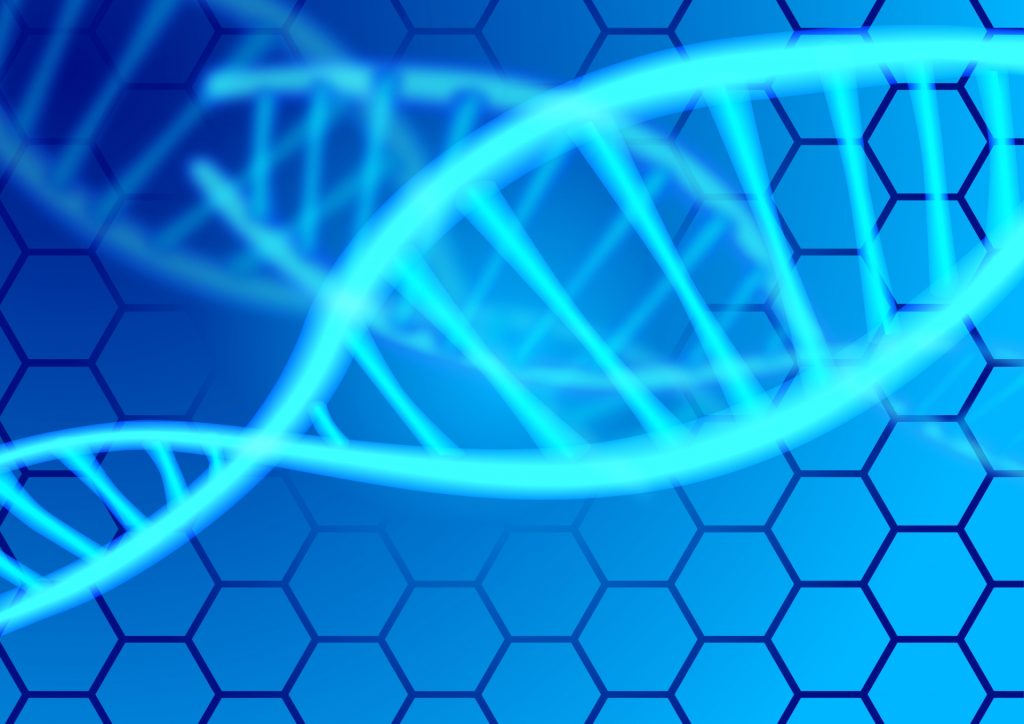
Introduction
In today’s society, stress is an unavoidable factor. However, even in the same environment, reactions to stress and mental health conditions vary from individual to individual. It has been pointed out that genes may be involved as a contributing factor to these differences. This article explores how genetic information influences stress tolerance and mental health based on the latest research.
Serotonin transporter gene and anxiety tendency

Serotonin is a neurotransmitter that plays an important role in the regulation of mood and emotion. The serotonin transporter gene (5-HTTLPR) regulates serotonin reuptake and affects its function. There are “L” (long) and ‘S’ (short) variants of this gene, which in combination form three genotypes: “LL,” “SL,” and “SS. Studies have shown that people with the “S” type are more anxious, while those with the “L” type are more optimistic about stress. In particular, it is reported that about 68.2% of Japanese people have the “SS” type and tend to feel anxiety easily.
Interaction between genes and the environment
While genes influence stress tolerance and mental health, environmental factors cannot be ignored. For example, studies have shown that the nurturing environment during childhood influences stress tolerance. In experiments with rats, it was observed that offspring rats that received frequent grooming from their mothers had greater stress tolerance and lower anxiety tendencies when they grew up. This phenomenon has been explained by epigenetic changes called DNA methylation.
Application to Mental Health Management
By utilizing genetic information, it is possible to understand individual stress tolerance and mental health tendencies and take appropriate measures. For example, by knowing the type of serotonin transporter gene, one can understand one’s own anxiety tendencies and devise ways to manage stress. In addition, interventions that promote the function of the Tob gene are expected to be a new treatment option in the future.
A Gene-Based Approach to Stress Tolerance

Personalized Stress Management
By utilizing genetic information, it is possible to analyze individual stress tolerance and find more effective stress management methods. For example, people with the “SS” type of the 5-HTTLPR gene are generally more prone to anxiety, and relaxation methods and mindfulness practices are recommended. On the other hand, people with the “LL” type are more resilient to stress and may be suitable for cognitive behavioral therapy (CBT) to improve stress tolerance.
Nutrition and Genes
Stress tolerance is also greatly affected by diet. In particular, foods containing tryptophan (e.g., bananas, nuts, soy products), which helps produce serotonin, and omega-3 fatty acids (e.g., blue fish, flaxseed oil, walnuts), which reduce brain inflammation, are effective in maintaining mental health. In addition, foods high in folate (e.g., spinach, avocados) are recommended because mutations in the MTHFR gene reduce the ability to metabolize folic acid and increase the risk of depressive symptoms.
Exercise and Stress Response
Exercise is an important component of stress tolerance. In particular, the relationship between the BDNF (brain-derived neurotrophic factor) gene and exercise is attracting attention; BDNF promotes neural growth and plasticity and helps prevent stress-induced brain damage. Studies have shown that people with a specific mutation (Val66Met) in the BDNF gene tend to have lower resilience to stress, so moderate aerobic exercise (jogging, cycling, yoga, etc.) is recommended.
Relationship between Sleep and Genes
Adequate sleep is essential for stress management, and it is known that mutations in the PER3 gene affect sleep quality; there are long (PER3-5/5) and short (PER3-4/4) types of the PER3 gene, and people with the short type tend to be more nocturnal, and are more likely to have poor sleep quality It has been reported that people with the short type tend to be more nocturnal and are prone to poor sleep quality. Such people need to avoid blue light before bedtime and maintain a regular sleep rhythm.
Individualized genetic testing
In recent years, genetic testing has been used to manage mental health as part of personalized health care. Based on genetic information, appropriate supplements, diet, and exercise programs can be selected to maximize stress tolerance. For example, if a particular genetic mutation is associated with depressive symptoms, early intervention by a physician can prevent the progression of symptoms.
Practical approaches to enhance stress tolerance and mental health

Genetic Influences on Meditation and Mindfulness
Meditation and mindfulness are effective in stress management, but one of the reasons these practices have different effects on different individuals involves genes.
Studies have shown that different variants of the COMT (catechol-O-methyltransferase) gene have different abilities to metabolize stress hormones, which may alter the effects of meditation; those with the “Met” variant of the COMT gene are more susceptible to stress, while those with the “Met” variant of the COMT gene are more likely to experience the benefits of mindfulness meditation is believed to have a stronger effect on the body.
In addition, people with certain variants of the oxytocin receptor (OXTR) gene tend to show stronger effects in reducing interpersonal stress. This suggests that the ability to develop empathy and social bonding is influenced at the genetic level.
Improving Mental Health Through Environmental and Genetic Interactions
The field of epigenetics, or epigenetics, has shown that environmental factors can affect gene expression. For example, chronic stress may alter DNA methylation and suppress the expression of genes involved in the stress response (e.g., the NR3C1 gene).
However, these changes can be reversed under the right circumstances and have been shown to be ameliorated by positive lifestyle choices. Specifically, the following habits are recommended
- Use of social support: Good relationships with friends and family promote oxytocin release and improve stress tolerance.
- Contact with nature: forest bathing and gardening promote the lowering of stress hormones, and lead epigenetic changes in a positive direction.
- Artistic activities: Creative activities such as music and painting promote dopamine release in the brain and contribute to stress reduction.
Customized Mental Health Care Using Genes
In recent years, customized mental health care utilizing genetic testing has been attracting attention. For example, in the U.S., personalized counseling services based on genetic testing are provided to identify individual stress tolerance and mental health risks, and then suggest appropriate interventions.
In Japan, stress management programs based on individual genetic information are also being developed, and training to balance stress hormones and promote neuroplasticity in the brain is being introduced.
Future Prospects
It is predicted that advances in AI and genetic analysis technology will enable more precise mental health management in the future; systems are being developed that allow AI to analyze an individual’s genetic data and lifestyle data and propose optimal plans for stress management and depression prevention in real time.
In addition, the development of genome editing technologies (e.g., CRISPR-Cas9) may make it possible to adjust genes related to stress tolerance. However, ethical issues and long-term effects must be carefully considered.
Relationship between genes and stress hormones

Cortisol is a typical hormone secreted during stress. The amount and duration of cortisol secretion depends on individual genetic characteristics. In particular, the NR3C1 (glucocorticoid receptor) gene is responsible for regulating cortisol sensitivity.
NR3C1 gene variants and stress response
People with certain mutations in the NR3C1 gene may have an increased sensitivity to stress and prolonged cortisol secretion. This can lead to chronic stress states and increase the risk of depression and anxiety disorders. Conversely, people with the more stress-resistant type of NR3C1 gene tend to have short-lived cortisol secretion and recover from stress more quickly.
Given these genetic factors, it is important to optimize stress management methods on an individual basis. For example, people with high stress sensitivity of the NR3C1 gene can reduce cortisol secretion by actively adopting relaxation techniques (deep breathing exercises, yoga, meditation, etc.).
Stress-related genes and risk of psychiatric disorders

Low stress tolerance is also closely linked to the risk of developing mental illness. Studies have shown that depression, anxiety disorders, and post-traumatic stress disorder (PTSD) involve specific gene variants.
5-HTTLPR gene and mental health
The aforementioned serotonin transporter gene (5-HTTLPR) is also involved in the risk of developing depression. In particular, people with the “SS” type are more sensitive to stress and more prone to depression. In fact, past studies have shown that people with the “SS” type have a higher incidence of depression when placed in a highly stressful environment.
FKBP5 gene and PTSD
The FKBP5 gene is involved in the regulation of the stress response and has been linked to post-traumatic stress disorder (PTSD) in particular; studies have shown that individuals with specific variants in the FKBP5 gene are more likely to develop PTSD after experiencing trauma. When this gene is mutated, stress hormones are not regulated properly, and past trauma can have long-term psychological consequences.
Considering these genetic factors, early intervention is important for those at high risk for mental illness. By utilizing genetic testing, it is possible to identify individual risks and take appropriate stress countermeasures.
Current genetic research for stress management

Advances in genetic research have led to the development of a number of new methods to help manage stress. The following is a partial list of recent research findings that have received much attention.
Stress Tolerance through Gene Editing
Research is underway to improve stress tolerance using gene editing technologies such as CRISPR-Cas9. For example, it has been suggested that enhancing the expression of the Tob gene may reduce anxiety and depression. Although currently in the animal testing stage, it is expected that this technology will be applied to improve human mental health in the future.
Microbiome and gene interactions
The relationship between gut bacteria (microbiome) and genes is another important factor that influences stress tolerance. Certain gut bacteria (e.g., Lactobacillus spp. and Bifidobacterium bifidum) have been shown to modulate the stress response, and consuming foods high in these bacteria (yogurt, fermented foods, etc.) can help build stress tolerance.
Gene-based drug therapy
Gene-based pharmacotherapy to improve stress tolerance and mental health is also currently under study. For example, drugs that increase the activity of the BDNF (brain-derived neurotrophic factor) gene have been developed and are expected to prevent stress-induced nerve damage.
The Future of Personalized Medicine Using Genetic Information

The era of “Precision Medicine,” in which genetic information is used to individually optimize stress tolerance and mental health, has arrived.
Individualized stress management through genetic testing
Many companies now offer genetic testing services to analyze individual stress tolerance. For example, by taking a genetic test, one can learn about one’s stress response tendencies and appropriate stress countermeasures.
Mental Health Support by AI
Using AI technology, systems are being developed to manage mental health in real time by combining genetic information with daily health data. In the future, apps and wearable devices that suggest stress countermeasures best suited to individual lifestyles based on genetic information may become widespread.
Lifestyle and Genetic Relationships for Improving Stress Tolerance

While genes certainly have a significant impact on stress tolerance, they are not the only factor. Environmental factors and lifestyle habits can alter gene expression. Here we will discuss in more detail the lifestyle habits that can enhance stress tolerance and the genes involved.
① Diet and Stress Tolerance
Diet is one of the most important factors influencing stress tolerance. In particular, it is important to consume nutrients involved in the synthesis of neurotransmitters such as serotonin and dopamine.
- Tryptophan (precursor to serotonin)
- Foods containing: bananas, nuts, dairy products, soy products, turkey
- Genes affected: TPH2 gene (regulates serotonin synthesis)
- Omega-3 fatty acids (reduce brain inflammation and smooth neurotransmission)
- Foods containing: bluefish (salmon, mackerel, sardines), flaxseed oil, walnuts
- Genes affected: BDNF gene (promotes neural plasticity)
- Magnesium (regulates stress hormones)
- Foods containing: almonds, spinach, dark chocolate
- Genes affected: NR3C1 gene (regulates cortisol sensitivity)
Conscious consumption of these nutrients can help balance stress hormones and improve stress tolerance.
② Sleep and Genes
Getting enough sleep is also very important for stress tolerance. Several genes are involved in sleep quality and rhythm.
- PER3 gene: a gene that regulates sleep rhythms. People with the short variant tend to be more nocturnal, and are more prone to sleep deprivation.
- CLOCK gene: regulates circadian rhythm (body clock). Mutations may result in poor sleep quality.
For those susceptible to these genes, it is especially important to avoid blue light before bedtime and maintain a consistent sleep schedule.
③ Exercise and Stress Response
Exercise is one of the most effective ways to improve stress tolerance. In particular, studies have shown that aerobic exercise improves neuroplasticity in the brain.
- Genes affected: BDNF gene
- BDNF (brain-derived neurotrophic factor) is a protein that aids in the growth and repair of nerve cells and helps prevent stress-induced nerve damage.
- Exercise increases BDNF secretion and improves stress tolerance.
Incorporating moderate exercise (jogging, yoga, stretching, etc.) into your daily routine will help you build a stress-resistant body.
Examples of Mental Health Care Using Genetic Information

In recent years, personalized mental health care utilizing genetic testing has been attracting attention. This presentation will introduce specific examples of how mental health management based on genetic information is actually implemented.
① Assessing Stress Risk with Genetic Testing
Some mental health clinics in the United States offer a service that analyzes a patient’s genes to assess their sensitivity to stress and risk for anxiety. For example, the following information can be obtained from genetic testing
- Variants of the 5-HTTLPR gene (assessment of anxiety tendency)
- Mutations in the NR3C1 gene (ability to regulate cortisol)
- BDNF gene expression levels (neural resilience)
This will suggest stress management methods tailored to individual risks.
② Mental health support using AI and genetic information
Using AI technology, mental health management systems that combine genetic and lifestyle data are also being developed. For example, in Japan, an application that evaluates stress tolerance based on genetic information and suggests individually appropriate stress countermeasures is now available.
This allows you to receive personalized advice, for example, “You have the SS form of the 5-HTTLPR gene, which makes you prone to anxiety. You can receive personalized advice such as, “Making daily mindfulness meditation a habit will help reduce your anxiety.
The Future of Genetic Research and the Potential for Stress Management
Research on genes and stress tolerance is expected to develop further in the future. In particular, progress is expected in the following areas.
① Genome Editing for Stress Tolerance
Attempts are underway to modify stress-sensitive genes and improve stress tolerance using technologies such as CRISPR-Cas9. For example, it has been suggested that enhancing the function of the Tob gene may reduce anxiety and depression.
② Precision medicine (Precision Medicine)
Mental health treatment optimized for the individual using genetic information may become commonplace. In the future, treatment for depression and anxiety may be based on genetic testing.
③ Elucidation of the relationship between intestinal bacteria and genes
The impact of gut bacteria (microbiome) on stress tolerance is also being studied. By increasing certain gut bacteria, treatments may be developed to improve stress tolerance.
Practical Application of Stress Tolerance and Genetic Testing

Stress management utilizing genetic testing is already being implemented by some medical institutions and companies. This section details examples of actual use and future possibilities.
① Corporate Stress Management Using Genetic Testing
An increasing number of companies in Japan are using genetic testing to support employee mental health. For example, some companies have introduced programs that use genetic testing to assess stress tolerance and mental health risk and suggest appropriate work styles and stress countermeasures for each employee.
Examples of actual implementation
- Employees identified as having low stress tolerance → Mindfulness training and short breaks recommended
- Employees with genotypes that are not suited to shift work → Adjust to work mainly in the daytime
- Genotypic employees with high stress tolerance but prone to chronic fatigue → Encourage regular refresher leave
It is expected that the mental health environment in the workplace will be greatly improved if this kind of individualized treatment becomes possible.
② Sports mental training using genetic testing
An increasing number of top athletes are using genetic testing to improve their stress tolerance. In particular, knowing their tolerance to pre-game pressure and how quickly they recover from stress can help improve performance.
Examples of Research Results
- Athletes with the “LL” form of the 5-HTTLPR gene are less nervous before games and more likely to maintain a stable mental state.
- Different COMT gene variants have different aptitudes in sports that require instantaneous force and those that require endurance.
- Athletes whose BDNF gene is more likely to be activated recover more quickly from stress and are more likely to tolerate prolonged training.
Based on this information, optimal mental training and rest methods can be introduced for each player to maximize performance.
summary
Genes have a significant impact on stress tolerance and mental health. The 5-HTTLPR gene (anxiety tendency), the NR3C1 gene (stress hormone regulation), and the BDNF gene (nerve resilience) are particularly important. However, lifestyle habits such as diet, exercise, and sleep can also influence gene expression and improve stress tolerance. In recent years, individualized and optimized stress management using genetic testing has progressed, and future mental health care combined with AI technology is also expected. However, one must also be aware of the risk of misuse and discrimination of genetic information.


